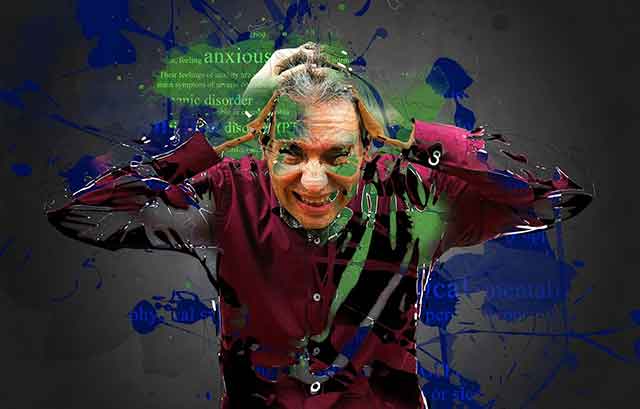Services
- Home
- Mental Health Services
- Who We Treat
- How We Treat
- Patients & Visitors
- About
close

You probably feel the onset of anxiety through a variety of physical symptoms. Your hands get sweaty and clammy, tension starts to build in your head, and then you feel a need to start breathing exercises to reduce your clenched chest. You might notice an extreme agitation building as well.
You may even feel the blood circulating throughout your body and start to pound in rhythm with your heart.

If you’re like many people, you may even joke to break the tension and wonder out loud if your blood pressure is rising like steam off your head. Is this the day you’ll finally blow up on your family or coworkers with a mini tantrum to get the relief you’re seeking? Verbally lashing out to others as a punching bag to relieve your stress and anxiety is non-productive to reaching your goal. It can also be self-destructive to you and cause harm to your relationships.
Getting caught in these thought patterns is understandable. However, recognizing that you're not getting the results you want means you need to change to more effective ways to relieve stress. Anxiety is common, manageable, and your body is asking you to take a few breaths and do something different.
Anxiety can be experienced by all ages from children to teens and through adulthood. It affects one in four children between the ages of 13 and 18 and is more common in women than men. Women are more likely to seek treatment and men are less likely to discuss their emotional well-being so the need for treatment may remain unspoken to loved ones.
The study of physiology expanded to understand whether the body’s reactions were in response “to” something. In the early 1900s, Walter Cannon coined the term “fight or flight” to promote the understanding that the body will produce the same adrenaline response in “fight” mode as in “flight” from a perceived threat. He only considered the one variable of adrenalin however and didn’t recognize the physiological and other biochemical occurrences in place.
The term anxiety is often used interchangeably with stress and psychologists tended to stay away from using it, until mid-century. The term stress had some stigma from decades past where people whispered that someone had nervous symptoms.
Adrenaline increases your heart rate, blood pressure, and focus to provide a surge of energy to immediately react in a short-lived situation. For example, if a child was in the way of an oncoming vehicle, you’d act quickly to grab the child because of the adrenaline boost. Your internal systems would return to normal state relatively quickly and you might be inclined to rest or nap to regain lost energy.
Cortisol is another hormone activated in stressful situations to provide immediate energy by triggering glucose production. It takes a few more minutes than adrenaline to respond but will produce the same powerful energy boost in survival mode. It tends to last longer in cases of recurring, or chronic, stress events such as long work hours or family dysfunctions.
Cortisol targets the heart at the expense of the other systems in the body; in turn, these system malfunctions can cause heart problems as well. Blood pressure that could lead to a heart attack or stroke is just one of several side effects of this problem if it remains chronic.

Short periods of high blood pressure can be brought on sporadically, but people with anxiety disorders have the same likelihood to develop chronic high blood pressure as those without.
These spikes can also happen frequently enough to cause the blood vessel damage found in hypertension, which in turn places stress on the heart, kidneys, and brain.
In addition to periodic spikes, associated dysfunctional coping skills for anxiety are other contributors to increased high blood pressure in the long term. These include smoking, drinking alcohol, and overeating.
So now that you know what happens in your body when anxiety causes blood pressure to spike short-term, how can we manage the situations that cause the cycling rise and fall and the unhealthy coping methods?
Men, women, and teens may have different sources of anxiety depending on their stage of life. But everyone can benefit from similar methods, perhaps with a tweak that suits them better.
Restoring balance to your sympathetic nervous system that is in charge of releasing the cortisol effect is an important part of your overall well being. Being proactive is key to maintaining stress levels before bad habits are substituted or longer-term effects such as high blood pressure become a factor.
Here are some strategies to get in the habit of practicing. When a situation that does cause stress presents itself, it is good to remember these to slow down your learned responses.


Navigating treatment can be a lonely, confusing, and emotional experience for someone with an anxiety disorder—or their loved ones.
You may be asking yourself the following questions:
But considering the millions who share this struggle, you are not alone. One in five adult Texans will experience a mental health concern at some point this year, according to the National Alliance on Mental Illness. Anxiety disorders are those most common in the country, encountered by around 40 million people.
At SUN Behavioral Houston, we will help you find the hope you need in anxiety disorder treatment options. You are not alone in this, we're here 24/7. Call us today at 713-796-2273.
Can Stress and Anxiety Raise My Blood Pressure?
Anxiety and stress typically raise blood pressure for short amounts of time. Nicotine, alcohol use, and obesity are more chronic contributors to prolonged high blood pressure.
How Can I Lower My Blood Pressure From Anxiety?
Practicing healthy anxiety management strategies is key to keeping your symptoms at bay and will keep your blood pressure within the recommended range.
Having a happy social life, good nutrition and exercise, and avoiding alcohol, nicotine, and caffeine can also keep anxiety in check. When you are experiencing anxiety, try breathing and relaxation exercises, and journal your dates and times of anxiety to redirect your patterns. Talking with others who experience the same symptoms can also be helpful.
How Do You Feel When You Have High Blood Pressure?
Blood pressure is the force of blood pushing against the walls of arteries as the heart pumps blood. High blood pressure, also referred to as hypertension, is when that force is too high and begins harming the body. If left untreated, it will eventually cause damage to the heart and blood vessels.
Many people don’t know they have an elevated blood pressure level unless they are checked at a doctor’s office, but nearly half of all Americans have it, according to the American Heart Association.
You may experience nosebleeds, facial flushing, or feel dizzy, but these symptoms could be indicative of other conditions. High blood pressure needs to be clinically diagnosed by a licensed healthcare professional.